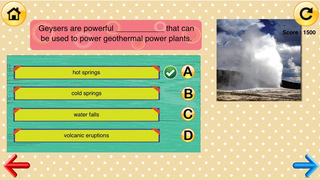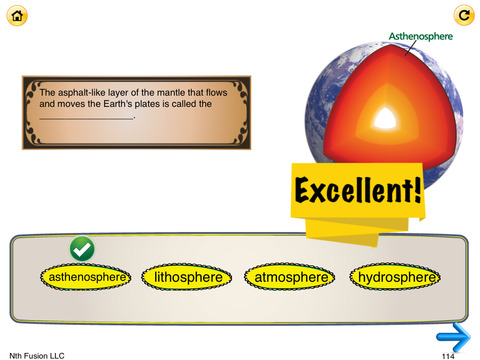5th Grade Science Quiz # 1 for home school and classroom

- Publisher: Nth Fusion LLC
- Genre: Education
- Released: 21 Oct, 2014
- Size: 111.2 MB
- Price: $0.99
 Click here to request a review of this app
Click here to request a review of this app
- App Store Info
Description
Need to prepare your kid for the 5th grader state exam in science? This app is first part of the two part science quiz series. Fifth graders are required to take and get a passing grade on the science test given by the state. The "5th Grade Science Quiz" app series will help your kid in preparing for the science exam. Our curriculum specialist has handpicked questions that will test various science concepts that a fifth grader needs to know.The app is a practice drill for students of ages 9-11 years old. In this app, we have not only given traditional multiple choice questions but supplemented with illustrations for the answer choices to give a better understanding about the answer. There are 10 sets of practice drills, with 15 questions in each set. Covers 5th grade science common core curriculum and Texas curriculum. This app will go nicely with other science learning and glossary apps to teach science concepts to our young students and will help tremendously in their journey towards STEM. Teachers and parents can also leverage this app in preparing for exams with students.
The next upgrade of this app will also have voice narration for helping slow learning students. Illustrations and voice are powerful techniques to remember various difficult science concepts.
Features of the app:
+ Curriculum based hand chosen numerous sets of quizzes.
+ Beautiful illustrations
+ Inspiring feedback to students
This app series ( part 1 & part 2 ) covers Quiz questions in these following topics:
+ Matter and Energy
- Classify matter based on physical properties - mass, magnetism, physical state (solid, liquid, and gas),
- Classify matter based on relative density (sinking and floating), solubility in water, and the ability to conduct or insulate thermal energy or electric energy.
- Identify the boiling and freezing/melting points of water on the Celsius scale;
- Demonstrate that some mixtures maintain physical properties of their ingredients such as iron filings and sand;
+ Force, motion, and energy
- Uses of energy, including mechanical, light, thermal, electrical, and sound energy;
- The flow of electricity in circuits.
- Light travels in a straight line until it strikes an object or travels through one medium to another (reflection, refraction)
+ Earth and space
- Formation of sedimentary rocks and fossil fuels;
- How landforms such as deltas, canyons, and sand dunes are the result of changes to Earth’s surface by wind, water, and ice;
- Alternative energy resources such as wind, solar, hydroelectric, geothermal, and biofuels;
+ Organisms and environments
- Observe the way organisms live and survive in their ecosystem by interacting with the living and non-living elements;
- Describe how the flow of energy derived from the Sun, used by producers to create their own food, is transferred through a food chain and food web to consumers and decomposers;
- Effects of changes in ecosystems caused by overpopulation of grazers or the building of highways;
- Identify the significance of the carbon dioxide-oxygen cycle to the survival of plants and animals.
+ Scientific Investigation and Reasoning Skills
- Use safety procedures and environmentally appropriate and ethical practices while conducting investigations.
- Ask well-defined questions, formulate testable hypotheses, and select and use appropriate equipment and technology;
- construct appropriate simple graphs, tables, maps, and charts using technology to organize, examine, and evaluate information
- Develop a model that represents how something works.
- Collect, record, and analyze information using tools, including calculators, microscopes, cameras, computers, hand lenses
- Use metric rulers, Celsius thermometers, prisms, mirrors, triple beam balances

























